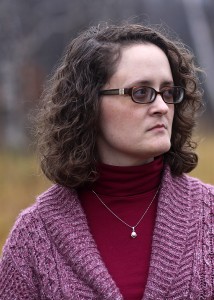 When her daughter was born eleven years ago, poet Julie Brooks Barbour wanted to know why everyone lied to her about motherhood. “People would say things like, ‘It goes so fast. Enjoy these moments,’ and I thought ‘Why is nobody telling the truth?’” Barbour began seeking out poetry by women who had children, but it was a challenge to find work that was honest and not intended for a laugh. Eventually, she stumbled upon Alice Notley’s, “A Baby Is Born Out of a White Owl’s Forehead,” originally published in 1972:
When her daughter was born eleven years ago, poet Julie Brooks Barbour wanted to know why everyone lied to her about motherhood. “People would say things like, ‘It goes so fast. Enjoy these moments,’ and I thought ‘Why is nobody telling the truth?’” Barbour began seeking out poetry by women who had children, but it was a challenge to find work that was honest and not intended for a laugh. Eventually, she stumbled upon Alice Notley’s, “A Baby Is Born Out of a White Owl’s Forehead,” originally published in 1972:
My baby is quiet and wise, but I’m
a trade name and I’m
chaos
rainwater on a piano . . . .
Finally, Barbour had found someone who told the truth. “It’s one of those poems every mother should read,” she said, “because this is chaos, and for the first two years there’s no me here.” Notley gave Barbour the glimmer of hope she needed to keep searching. She went on to discover other poets who wrote truthfully about motherhood, and about the body: Lucille Clifton, Eavan Boland, and Nikky Finney, for example, and then Barbour started writing her own poems about motherhood as identity. “I’ve always been interested in the feminine and the body,” she said, “but when my daughter was born she really brought it together for me.”
The poems from Barbour’s first chapbook, Come to Me and Drink (Finishing Line Press) address the ways a woman figures out who she is once she’s become a mother. “I kept asking: How do you keep in touch with yourself when you feel split apart, when you’re only allowed to show certain sides?” Barbour said. After reading her work, it’s clear that poetry became the perfect solder for the poet’s split selves.
The title poem from Come to Me and Drink, which will also appear in Small Chimes, a full-length manuscript due out from Aldrich Press later this year, is one example of that fine weld:
Come to Me and Drink
I know what she tastes: the ambrosia
that one morning fell in drops
from my breast to my arm. Tasting it,
my tongue recalled the white and yellow
blossoms of honeysuckle sprouting wild
along a field’s edge. Collecting vine upon vine,
I’d pluck each sweet blossom, pull out
each green stamen, careful not to lose
the drop of nectar at its tip, delighting
my tongue with the watery sugar.
Now the gods put me on the vine.
The buds of my nipples are pink
and dripping. An infant plucks me dry,
a sweet smell on her breath. This liquid:
a heal-all for a stomach-ache, a sedative
for the sleepless child making her bed
in the field’s tall grass. Her lips suckle in sleep.
Her tongue clicks in her mouth, an exercise.
The passing breeze my voice,
whispering around her ear. My arms vines
coaxing her to come to me and drink.
(Originally published at Inscape / Morehead State University)
The subject of women’s identity has certainly kept Barbour inspired, as she has a second chapbook, Earthlust (Finishing Line) also due out this year. Earthlust considers the ways girls are taught to be desirable, how a woman keeps her identity in the face of sexual desire, and the institution of marriage. Many of the poems are re-tellings of fairytales; for example, the series “The Woman without Hands” takes a fairytale character whose hands were cut off by her father, and imagines how she continues to accomplish necessary tasks, such as breastfeeding: “forehead to forehead, she nuzzles him like an animal. / She cannot sling him around to her back like a bear.”
“At one point in the fairytale, her husband gives her silver hands, and I thought, ‘Dear Lord, what is she going to do with those?” Barbour said. In the end, (spoiler alert) she removes the silver hands, her own hands grow back, and she uses them to discover her body. The series acts as a metaphor for the many ways women empower themselves despite being told what they are and are not allowed to do.
In fact Barbour has been told that she should write about other subjects, should write poems that are less soft-hearted. Her response: “Just because I’m writing about being a woman doesn’t mean I’m being sentimental,” she said. “It doesn’t mean that I’m sugar-coating it.”
Other poets who inspire Barbour include: Jeannine Hall Galey, Sally Rosen Kindred, Mary Biddinger, Marianne Boruch, Susan Grimm, and Mary McMyne.
“Hearing Voices – Women Versing Life” is a continuation of a series that originally appeared at Ploughshares.